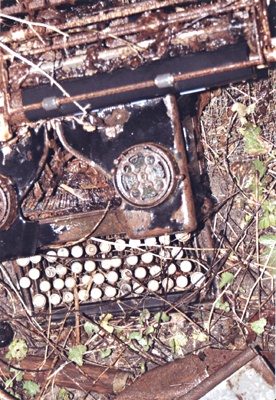All Nonfiction
- Bullying
- Books
- Academic
- Author Interviews
- Celebrity interviews
- College Articles
- College Essays
- Educator of the Year
- Heroes
- Interviews
- Memoir
- Personal Experience
- Sports
- Travel & Culture
All Opinions
- Bullying
- Current Events / Politics
- Discrimination
- Drugs / Alcohol / Smoking
- Entertainment / Celebrities
- Environment
- Love / Relationships
- Movies / Music / TV
- Pop Culture / Trends
- School / College
- Social Issues / Civics
- Spirituality / Religion
- Sports / Hobbies
All Hot Topics
- Bullying
- Community Service
- Environment
- Health
- Letters to the Editor
- Pride & Prejudice
- What Matters
- Back
Summer Guide
- Program Links
- Program Reviews
- Back
College Guide
- College Links
- College Reviews
- College Essays
- College Articles
- Back
Station Eleven by Emily St. John Mandel
Nose buried in Emily St. John Mandel’s Station Eleven, I was flying somewhere over Oklahoma City when I started to doubt the existence of a civilized world somewhere far below me. Visions of deserted airports intermingling with the taste of Wheat Thins, I glanced over at my father’s sleeping form and felt a sudden rush of gratitude. This is Station Eleven’s effect on the reader; through exquisite prose and an all-too-believable end to the world, we’re moved to both sadness and appreciation for all of life’s small pleasures and experiences.
Mandel’s novel depicts a world devastated by a virus, all technology and civilization destroyed. Kirsten Raymonde, a former child actress, travels with the Symphony, a group of musicians and Shakespearean actors who tour the ravished United States in caravans bearing the slogan “Because survival is insufficient.” Survivors typically greet them warmly; people cling to art representing the “best parts of the old world,” and so Shakespeare and classical music rule the day. But when the Symphony encounters a bizarre prophet whose strange beliefs threaten their safety, their world begins to come apart, while the uncanny connections between the book’s various and seemingly disjoint characters slowly begin to come together. As the prophet pursues the Symphony with intent to kill them, Mandel’s prose leaps backwards and forwards in time, revealing the protagonists’ current struggles, details of their lives before, and the circumstances that led the world to this end.
The story accomplishes two difficult feats without plot holes or lapses in focus. It conveys the bleakness of a world devoid of many everyday pleasures, like consuming an orange or talking on the telephone. The humanity of its characters is paramount; each both understandable and deeply flawed, artistic but hindered by emotional baggage. It also weaves together the various protagonists’ lives so seamlessly and deeply that as the catastrophic ending approaches, no stone is left unturned, no corner unexplored; every small detail is made to matter. Books with many distinct yet interconnected characters have the potential either to soar or to fall flat; Station Eleven attains the former, transcending others of its kind with its attention to detail and meticulous plot construction.
Theatre lovers will be drawn to this book because of The Symphony’s premise, but the novel is truly accessible to a much wider audience, as a book about humans rather than about artists. I leave you with this: Station Eleven compels the reader to give thanks for every moment, no matter how small. Mandel succeeds in reminding us what it means to be human, and how we can survive even the worst tragedies by valuing the little things, making life’s every moment seem special.

Similar Articles
JOIN THE DISCUSSION
This article has 0 comments.
